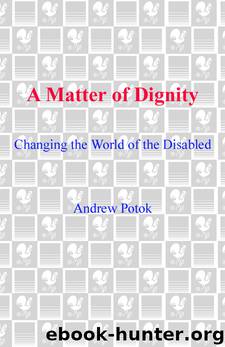A Matter of Dignity by Andrew Potok

Author:Andrew Potok [Potok, Andrew]
Language: eng
Format: epub
ISBN: 978-0-307-48109-2
Publisher: Random House Publishing Group
Published: 2002-08-26T04:00:00+00:00
SCHOLARS
ADRIENNE ASCH
professor oj bioethics
ROSEMARIE GARLAND THOMSON
professor of English
PAUL K. LONGMORE
professor of history
PROLOGUE
I met disability scholars for the first time at a conference of the Society for Disability Studies. “SDS, our initials, are no coincidence,” someone told me, referring to the Students for a Democratic Society of the 1960s. From my first encounter with the politics of this disability-oriented SDS, I felt very much at home.
“Disability studies?” a friend of mine, himself an academician, asked when I returned to Vermont. He thought he'd misheard. He tried saying it again. “Have they run out of categories of study?” he snickered, needing to tweak this thing further. “How about pedophile studies?”
In fact, scholars from all over the world had shown up. Some were disabled, some not. There were people from the arts and from the humanities, from English departments, from American studies, from philosophy, sociology, anthropology, law, political science and history, and though disability studies are not about cures, treatment, rehabilitation or the high-tech engineering of gene recognition, the disciplines of medicine, public health and rehabilitation were also represented. The papers presented were on views of the disabled in literature, film, the visual arts, on eugenics and euthanasia, on culture and identity, on epistemology, immigration laws, civil rights, accessibility, employment.
Throughout history, disability has been seen through varying lenses. Aside from the often sentimentalized mythology of disability stars, whatever history exists has come not from the marginalized disabled themselves but from ablebod-ied observers, anthropologists colonizing an exotic land.
Instead of viewing disability as a problem that needs to be fixed, disability-studies scholars are focusing on its social and cultural context. “Our society is based on the concept that everybody has to be normal,” one of them said. “It's a view that defines disability not as a physical defect inherent in bodies, but rather as a way of interpreting human differences. After all, gender is not simply a matter of genitals. So disability is a way of thinking about the nature of bodies, rather than concentrating on what is wrong with bodies.”
At the SDS conference, some of the audience, as well as some of the presenters on the many different panels, were in wheelchairs or wearing leg braces, were quads and partial quads, some mowed down by birth defect or accident or chronic illness, others with attendants standing by their sides, some talking with great difficulty, some fluttering spastically There were the deaf focusing on the signers, the blind listening intently. This was my community and it moved me deeply. As a matter of fact, it was exhilarating.
In the mix, there were scholars pure and simple, clarifying distinctions, carving out turf, but many of them were also the warriors of this relatively new movement that had started with a clamor for independent living in the 1960s, continued in the ‘70s with demonstrations that resulted in the implementation of otherwise gutless accessibility statutes, followed up, year after year, by brave actions that led eventually to the passage of the Americans with Disabilities Act. “Many of us were academics to begin with,” a disability scholar said.
Download
This site does not store any files on its server. We only index and link to content provided by other sites. Please contact the content providers to delete copyright contents if any and email us, we'll remove relevant links or contents immediately.
| Anthropology | Archaeology |
| Philosophy | Politics & Government |
| Social Sciences | Sociology |
| Women's Studies |
The Secret History by Donna Tartt(19088)
The Social Justice Warrior Handbook by Lisa De Pasquale(12190)
Thirteen Reasons Why by Jay Asher(8909)
This Is How You Lose Her by Junot Diaz(6886)
Weapons of Math Destruction by Cathy O'Neil(6279)
Zero to One by Peter Thiel(5801)
Beartown by Fredrik Backman(5754)
The Myth of the Strong Leader by Archie Brown(5507)
The Fire Next Time by James Baldwin(5444)
How Democracies Die by Steven Levitsky & Daniel Ziblatt(5218)
Promise Me, Dad by Joe Biden(5153)
Stone's Rules by Roger Stone(5087)
A Higher Loyalty: Truth, Lies, and Leadership by James Comey(4963)
100 Deadly Skills by Clint Emerson(4925)
Rise and Kill First by Ronen Bergman(4788)
Secrecy World by Jake Bernstein(4753)
The David Icke Guide to the Global Conspiracy (and how to end it) by David Icke(4718)
The Farm by Tom Rob Smith(4509)
The Doomsday Machine by Daniel Ellsberg(4490)
